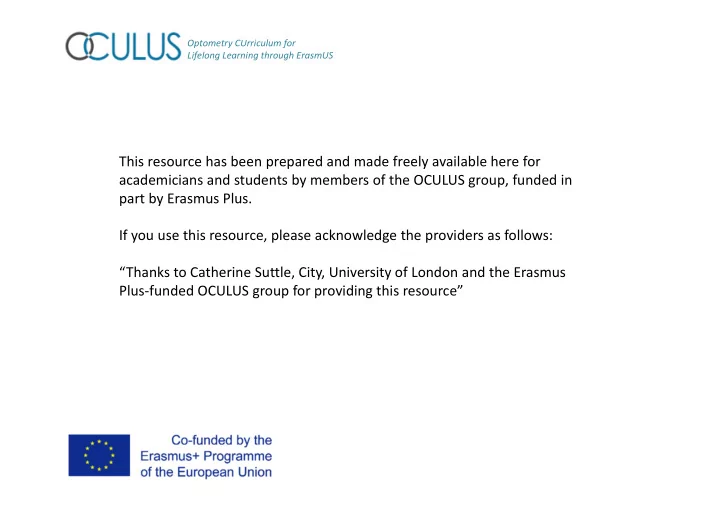

Optometry CUrriculum for Lifelong Learning through ErasmUS This resource has been prepared and made freely available here for academicians and students by members of the OCULUS group, funded in part by Erasmus Plus. If you use this resource, please acknowledge the providers as follows: “Thanks to Catherine Suttle, City, University of London and the Erasmus Plus ‐ funded OCULUS group for providing this resource”
EBP Workshop Catherine Suttle Optometry CUrriculum for Lifelong Learning through ErasmUS
In this session • We are going to: – Use an ophthalmic practice ‐ related scenario to find evidence – Follow the first two steps of the EBP process: • Ask • Acquire Tomorrow you will go through this process yourself Optometry CUrriculum for Lifelong Learning through ErasmUS
How we will do this • Using a clinical scenario, we will formulate an answerable question using the PICO method • Find evidence, starting at the highest level and working down Optometry CUrriculum for Lifelong Learning through ErasmUS
What is an ‘answerable’ question? • We can pose a question, but it might be too vague or ambiguous to find a specific answer. – Example: Does homeopathy work? • On the other hand, we can pose a specific question for which we can find information targeting that particular question – Example: Is homeopathy effective in the treatment of chronic open angle glaucoma? Optometry CUrriculum for Lifelong Learning through ErasmUS
Use of the ‘PICO’ method • This method helps us to ensure we include all important concepts in the question • The method often needs to be modified in order to include relevant concepts – For example, your scenario may include no intervention (I), and you may not want to include a comparison (C). – You may be interested in a diagnostic test, or perhaps in prevalence or prognosis of a particular condition. – See the EBOptometry web site for more on this Optometry CUrriculum for Lifelong Learning through ErasmUS
Where do we look for evidence? • Start at the top of the pyramid and work down if necessary • Start with one or more of these (or other) resources: – www.cochrane.org/ – www.trip.com – www.ncbi.nlm.nih.gov/pubmed Optometry CUrriculum for Lifelong Learning through ErasmUS
How do we look for evidence? • We use key words taken • For example, for the from our question question: – Is acupuncture effective • Narrow or broaden the as a treatment for search as needed glaucoma? – I might use the keywords acupuncture, effectiv* and glaucoma Optometry CUrriculum for Lifelong Learning through ErasmUS
No results are found with these search terms. The search was too narrow, and needs to be broadened. Optometry CUrriculum for Lifelong Learning through ErasmUS
Now we might try acupuncture glaucoma and see what comes up. 29 is a fairly manageable number, but we could narrow this down a bit to include only high level evidence. Optometry CUrriculum for Lifelong Learning through ErasmUS
Great – some systematic reviews – and the most recent is available via ‘open access’. Optometry CUrriculum for Lifelong Learning through ErasmUS
An example clinical scenario • True story! • A patient contacted the clinic to ask about some treatment she had heard about called perceptual learning which could improve reading in presbyopes, and asked whether we offered this, and what we thought of it. Optometry CUrriculum for Lifelong Learning through ErasmUS
Next, we need to refine the scenario into a question • Patient, population, • Have a go – talk with problem? your partner(s) and decide on each of these • Intervention, or test? components • Comparison? • Outcome? A patient contacted the clinic to ask about some treatment she had heard about called perceptual learning which could improve reading in presbyopes, and asked whether we offered this, and what we thought of it. Optometry CUrriculum for Lifelong Learning through ErasmUS
Our question and key words • So our question could • This suggests the be: following key words – Perceptual learning • Does perceptual – Near acuity learning improve near – Presbyope or presbyopia acuity in presbyopes? • We can use these key words in our search for evidence Optometry CUrriculum for Lifelong Learning through ErasmUS
The Cochrane database has only one article, which is not relevant. Optometry CUrriculum for Lifelong Learning through ErasmUS
A few research papers are available on Pubmed. What level of evidence are they? Are they relevant? Are they available? Optometry CUrriculum for Lifelong Learning through ErasmUS
This article describes relevant research which seems to be the highest level available on this question – so we could appraise this one. Optometry CUrriculum for Lifelong Learning through ErasmUS
Now you try: • Think of a clinical question you would like to answer • Form an answerable question • Identify key words from that question to form the basis of a search – [Here, you are conducting the first step, Ask] Optometry CUrriculum for Lifelong Learning through ErasmUS
Recommend
More recommend